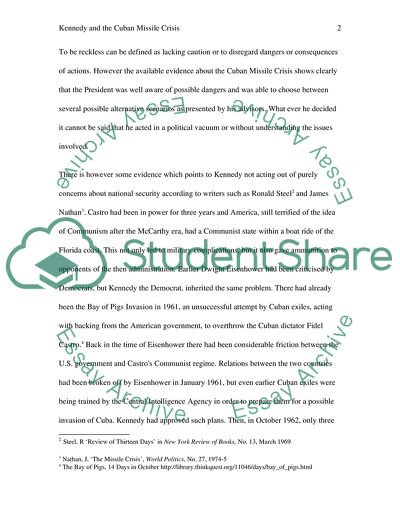Cite this document
(Kennedy and the Cuban Missile Crisis Essay Example | Topics and Well Written Essays - 2000 words, n.d.)
Kennedy and the Cuban Missile Crisis Essay Example | Topics and Well Written Essays - 2000 words. Retrieved from https://studentshare.org/military/1733688-argue-the-case-that-kennedy-mishandled-and-aggravated-the-cuban-missiles-crisis-with-his-own-political-benefit-chiefly-in-mind
Kennedy and the Cuban Missile Crisis Essay Example | Topics and Well Written Essays - 2000 words. Retrieved from https://studentshare.org/military/1733688-argue-the-case-that-kennedy-mishandled-and-aggravated-the-cuban-missiles-crisis-with-his-own-political-benefit-chiefly-in-mind
(Kennedy and the Cuban Missile Crisis Essay Example | Topics and Well Written Essays - 2000 Words)
Kennedy and the Cuban Missile Crisis Essay Example | Topics and Well Written Essays - 2000 Words. https://studentshare.org/military/1733688-argue-the-case-that-kennedy-mishandled-and-aggravated-the-cuban-missiles-crisis-with-his-own-political-benefit-chiefly-in-mind.
Kennedy and the Cuban Missile Crisis Essay Example | Topics and Well Written Essays - 2000 Words. https://studentshare.org/military/1733688-argue-the-case-that-kennedy-mishandled-and-aggravated-the-cuban-missiles-crisis-with-his-own-political-benefit-chiefly-in-mind.
“Kennedy and the Cuban Missile Crisis Essay Example | Topics and Well Written Essays - 2000 Words”. https://studentshare.org/military/1733688-argue-the-case-that-kennedy-mishandled-and-aggravated-the-cuban-missiles-crisis-with-his-own-political-benefit-chiefly-in-mind.


